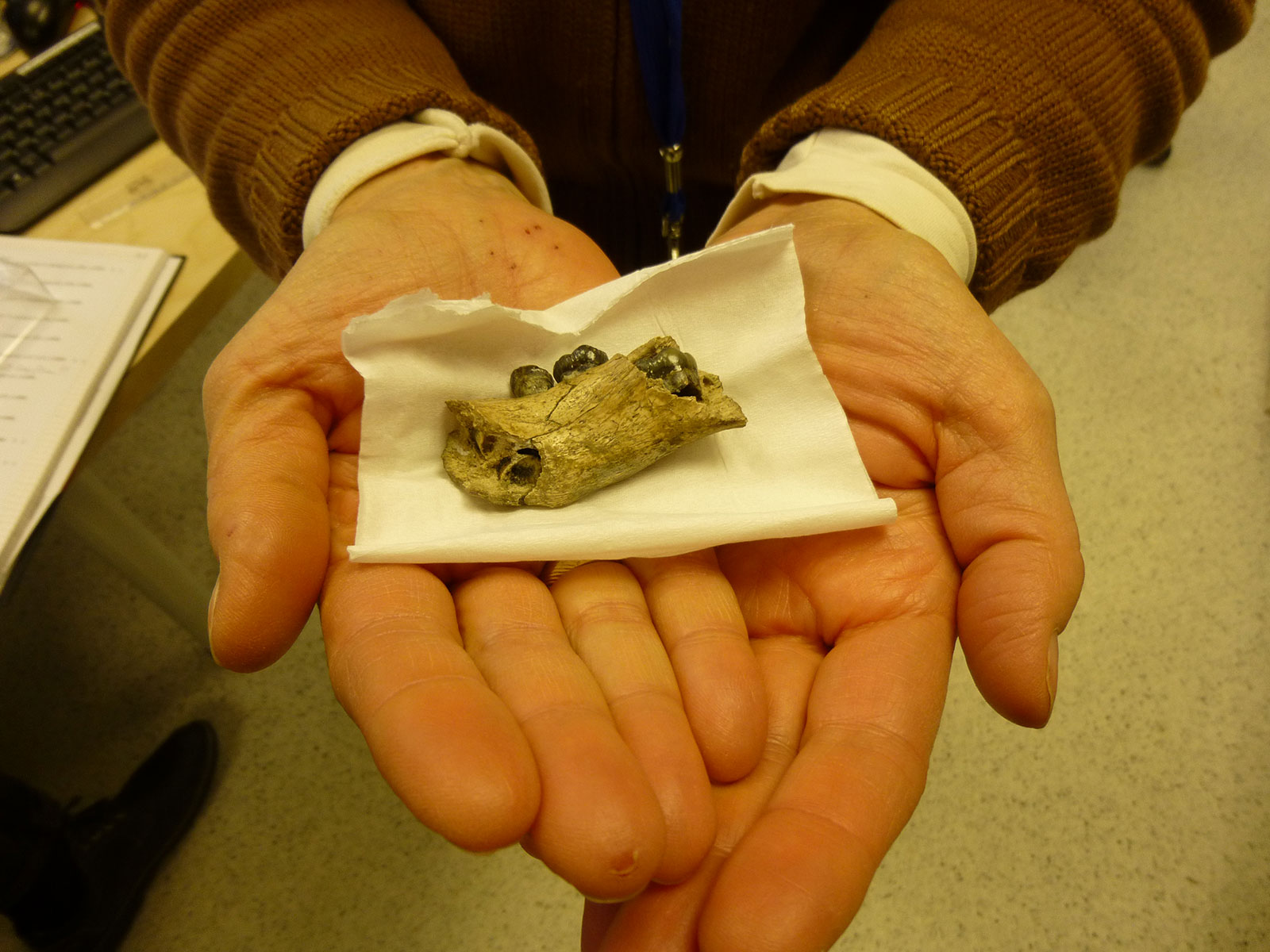Welcome to DU!
The truly grassroots left-of-center political community where regular people, not algorithms, drive the discussions and set the standards.
Join the community:
Create a free account
Support DU (and get rid of ads!):
Become a Star Member
Latest Breaking News
Editorials & Other Articles
General Discussion
The DU Lounge
All Forums
Issue Forums
Culture Forums
Alliance Forums
Region Forums
Support Forums
Help & Search
Anthropology
Showing Original Post only (View all)Two Million Years Ago, This Homo Erectus Lived the High Life [View all]
https://www.smithsonianmag.com/science-nature/two-million-years-ago-homo-erectus-likely-lived-in-cool-high-altitude-environments-180983073/Two Million Years Ago, This Homo Erectus Lived the High Life
Dating of a child’s fossilized jaw and teeth suggest our relatives lived at altitude earlier than once thought
Brian Handwerk
Science Correspondent
October 13, 2023

The mandible of the Homo erectus child Italo-Spanish Archaeological Mission at Melka Kunture, with ARCCH permit
Archaeologists are rewriting the story of an early human child whose fossilized jaw and impacted teeth were discovered more than 40 years ago in the Ethiopian highlands. Scientists used high-tech imaging to reveal that early humans, apparently Homo erectus, inhabited this high-altitude plateau two million years ago. Their work provides more evidence that even early in our evolutionary journey, our Homo ancestors weren’t confined to warm African lowlands. Instead, they took advantage of a variety of diverse environments—a precursor of their ability to subsequently spread out across the prehistoric world.
The team analyzed the teeth and jaw as never before, and they published their findings Thursday in Science. They compared the teeth to those of other early Homo species and suggest that the child was H. erectus. That group likely made and used the abundant stone tools of the Oldowan technology found with the fossil, the authors say, as well as the more advanced Acheulean tools also found in the area, from nearly the same time period. This suggests, the authors theorize, that these early highlanders adapted quickly to a high-altitude environment.
Study co-author Margherita Mussi, an archaeologist at Sapienza University in Rome, and colleagues combined two techniques: argon-argon dating and a recently completed paleomagnetic dating analysis to fine-tune the site’s ages. The fossil and Oldowan artifacts with it had previously been dated to 1.7 million to 1.8 million years ago, but revised ages now place them at some two million years old. The team also used advanced imaging technology to study the fossil and suggest which species it represents. “This analysis gave us information inside the teeth, in extremely high detail and comparison with a lot of teeth that are already assessed as Homo erectus,” Mussi says.
Researchers couldn’t determine the child’s sex based on the ancient teeth and jaw, but since so many such fossils have been categorized as male, Mussi took the liberty of deciding the ancient child was a girl whom she affectionally nicknamed “Little Garba.”
[...]
Dating of a child’s fossilized jaw and teeth suggest our relatives lived at altitude earlier than once thought
Brian Handwerk
Science Correspondent
October 13, 2023

The mandible of the Homo erectus child Italo-Spanish Archaeological Mission at Melka Kunture, with ARCCH permit
Archaeologists are rewriting the story of an early human child whose fossilized jaw and impacted teeth were discovered more than 40 years ago in the Ethiopian highlands. Scientists used high-tech imaging to reveal that early humans, apparently Homo erectus, inhabited this high-altitude plateau two million years ago. Their work provides more evidence that even early in our evolutionary journey, our Homo ancestors weren’t confined to warm African lowlands. Instead, they took advantage of a variety of diverse environments—a precursor of their ability to subsequently spread out across the prehistoric world.
The team analyzed the teeth and jaw as never before, and they published their findings Thursday in Science. They compared the teeth to those of other early Homo species and suggest that the child was H. erectus. That group likely made and used the abundant stone tools of the Oldowan technology found with the fossil, the authors say, as well as the more advanced Acheulean tools also found in the area, from nearly the same time period. This suggests, the authors theorize, that these early highlanders adapted quickly to a high-altitude environment.
Study co-author Margherita Mussi, an archaeologist at Sapienza University in Rome, and colleagues combined two techniques: argon-argon dating and a recently completed paleomagnetic dating analysis to fine-tune the site’s ages. The fossil and Oldowan artifacts with it had previously been dated to 1.7 million to 1.8 million years ago, but revised ages now place them at some two million years old. The team also used advanced imaging technology to study the fossil and suggest which species it represents. “This analysis gave us information inside the teeth, in extremely high detail and comparison with a lot of teeth that are already assessed as Homo erectus,” Mussi says.
Researchers couldn’t determine the child’s sex based on the ancient teeth and jaw, but since so many such fossils have been categorized as male, Mussi took the liberty of deciding the ancient child was a girl whom she affectionally nicknamed “Little Garba.”
[...]
16 replies
 = new reply since forum marked as read
Highlight:
NoneDon't highlight anything
5 newestHighlight 5 most recent replies
= new reply since forum marked as read
Highlight:
NoneDon't highlight anything
5 newestHighlight 5 most recent replies